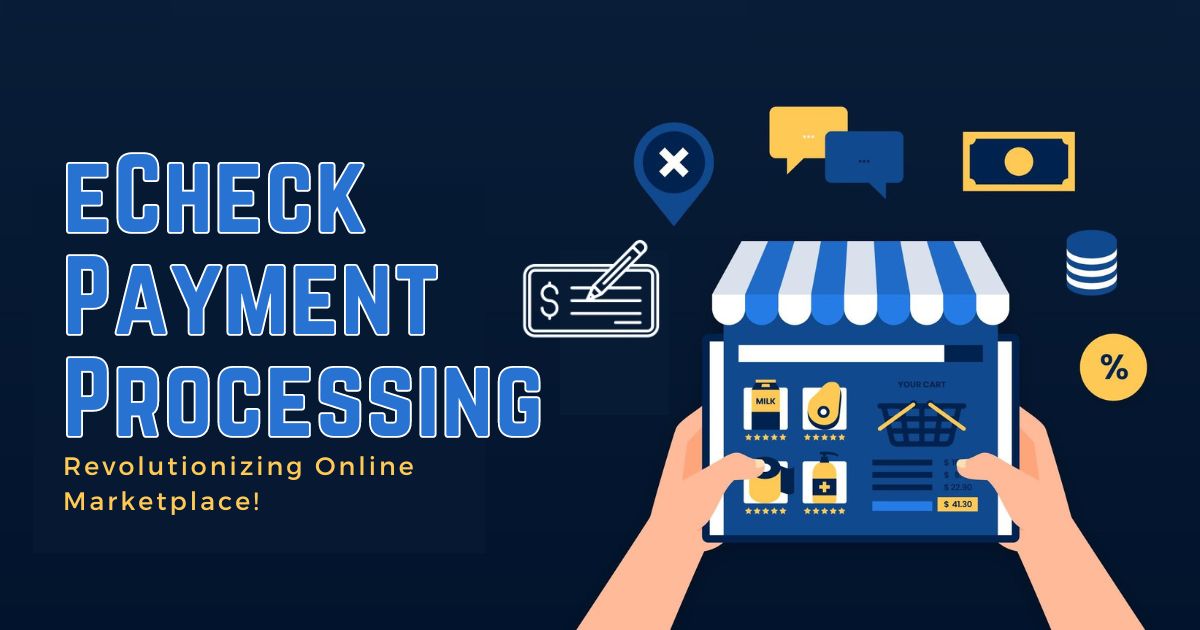
| December 19th, 2023 |
eCheck Payment Processing — Revolutionizing Online Marketplace!
The evolution of online marketplaces has radically transformed the way we shop, sell, and conduct transactions. In this digital era, payment processing systems play a pivotal role in ensuring smooth and secure transactions between buyers and sellers. Among the various methods available, electronic checks or echecks have emerged as a game-changer, offering convenience, security, and efficiency in online marketplace transactions.
Understanding Echeck Payment Processing —
Echecks, or electronic checks, are a digital version of traditional paper checks. They allow funds to be transferred directly from a payer’s bank account to the payee’s account electronically. The process involves capturing the payer’s banking information, such as account number and routing number, and authorizing the transfer of funds.
Advantages for Online Marketplaces —
1. Wider Consumer Base:
Echeck bridges the gap for consumers who prefer bank account transactions over credit cards. This broadens the customer base for online marketplaces, accommodating users who may not have access to credit cards or prefer direct bank transfers.
2. Reduced Transaction Costs:
Compared to credit card processing fees, echecks typically have lower transaction costs, making them an attractive option for marketplace platforms aiming to optimize their cost structures.
3. Enhanced Security:
Echecks leverage encryption and secure banking protocols, offering robust security measures to safeguard sensitive financial information during transactions. This reassures both buyers and sellers about the safety of their financial data.
4. Streamlined Transactions:
Echecks facilitate faster transactions compared to traditional paper checks. The electronic nature of echecks reduces processing times, enabling quicker payment confirmations and faster order fulfillment.
Implementing Echeck Payment Systems —
1. Integration with Marketplace Platforms:
To leverage echeck payment processing, online marketplaces need seamless integration with payment service providers that support echecks. APIs and plugins are often used to incorporate these systems into the marketplace’s existing infrastructure.
2. Compliance and Security Measures:
Adherence to stringent security standards, such as Payment Card Industry Data Security Standard (PCI DSS) compliance, and employing robust encryption methods are essential to ensure the safety of sensitive financial data.
3. User-Friendly Interface:
Creating an intuitive interface for users to input their bank details securely is crucial. Clear instructions and visual cues can help build trust and encourage users to adopt echecks as a preferred payment method.
4. Transaction Monitoring and Fraud Prevention:
Implementing real-time transaction monitoring tools and employing advanced fraud detection mechanisms is imperative to mitigate potential risks associated with online transactions.
Future Trends and Challenges —
1. Technological Advancements:
Continued advancements in technology, such as blockchain integration and AI-driven fraud detection, are expected to further enhance the security and efficiency of echeck payment processing.
2. Regulatory Compliance:
Adapting to evolving regulatory landscapes and compliance requirements poses a challenge. Marketplaces must stay updated with changing regulations to ensure legal adherence and maintain customer trust.
3. Global Expansion:
Expanding echeck payment systems globally involves addressing diverse banking systems and regulations across different countries, presenting a challenge for seamless international transactions.
Use Cases and Benefits —
1. Subscription-Based Services:
Echecks are ideal for recurring payments, making them a preferred choice for subscription-based services on online marketplaces. The automated nature of echeck transactions simplifies subscription renewals, reducing user intervention and ensuring a seamless experience.
2. High-Value Transactions:
For high-value transactions, echecks often offer lower processing fees compared to credit cards, making them an attractive option for both buyers and sellers dealing with significant amounts.
3. Mitigating Chargebacks:
Compared to credit card transactions that are prone to chargebacks, echecks provide a more stable payment method, reducing the risk of chargebacks and associated disputes, and benefiting sellers in particular.
Challenges and Mitigation Strategies —
1. User Adoption and Education:
Educating users about the benefits and safety measures of echeck transactions is crucial. Marketplaces need to provide clear information and support to instill confidence in users who might be new to this payment method.
2. Transaction Rejections and Failed Payments:
Occasional transaction rejections due to insufficient funds or incorrect account information can occur. Implementing systems to notify users promptly and guide them on rectifying issues can enhance user experience.
3. Regulatory Compliance Across Borders:
Operating in multiple jurisdictions entails adhering to diverse regulatory frameworks. Collaborating with legal experts and staying abreast of global compliance standards becomes essential for seamless cross-border transactions.
Market Trends and Innovations —
1. Mobile Echeck Processing:
The proliferation of mobile devices has led to the development of mobile-compatible echeck processing solutions, catering to the growing segment of users who prefer conducting transactions via smartphones and tablets.
2. Biometric Authentication:
Incorporating biometric authentication methods, such as fingerprint or facial recognition, can bolster security and streamline the echeck authorization process, further enhancing user convenience.
3. AI-Powered Analytics:
Utilizing artificial intelligence for predictive analytics and risk assessment can refine fraud detection capabilities, offering real-time insights into transaction patterns and improving overall security measures.
The Road Ahead —
As online marketplaces continue to evolve and user preferences shift, the integration of echeck payment processing will likely become an indispensable component of their payment ecosystems. The focus will be on innovation, security enhancement, and user-centric design to foster trust and convenience.
Final Thoughts —
Echeck payment processing has established itself as a reliable, secure, and cost-effective method for online marketplace transactions. Its continued evolution, coupled with advancements in technology and a focus on regulatory compliance, will pave the way for a future where echecks play an even more integral role in shaping the landscape of digital commerce.
In embracing these advancements and addressing associated challenges, online marketplaces can provide a seamless and secure payment experience, fostering trust among users and propelling the growth of digital commerce globally.